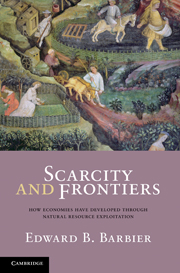Book contents
- Frontmatter
- Contents
- Figures
- Tables
- Boxes
- Preface
- Acknowledgements
- 1 Introduction: scarcity and frontiers
- 2 The Agricultural Transition (from 10,000 BC to 3000 BC)
- 3 The Rise of Cities (from 3000 BC to 1000 AD)
- 4 The Emergence of the World Economy (from 1000 to 1500)
- 5 Global Frontiers and the Rise of Western Europe (from 1500 to 1914)
- 6 The Atlantic Economy Triangular Trade (from 1500 to 1860)
- 7 The Golden Age of Resource-Based Development (from 1870 to 1914)
- 8 The Age of Dislocation (from 1914 to 1950)
- 9 The Contemporary Era (from 1950 to the present)
- 10 Epilogue: the Age of Ecological Scarcity?
- Index
- References
2 - The Agricultural Transition (from 10,000 BC to 3000 BC)
Published online by Cambridge University Press: 05 June 2012
- Frontmatter
- Contents
- Figures
- Tables
- Boxes
- Preface
- Acknowledgements
- 1 Introduction: scarcity and frontiers
- 2 The Agricultural Transition (from 10,000 BC to 3000 BC)
- 3 The Rise of Cities (from 3000 BC to 1000 AD)
- 4 The Emergence of the World Economy (from 1000 to 1500)
- 5 Global Frontiers and the Rise of Western Europe (from 1500 to 1914)
- 6 The Atlantic Economy Triangular Trade (from 1500 to 1860)
- 7 The Golden Age of Resource-Based Development (from 1870 to 1914)
- 8 The Age of Dislocation (from 1914 to 1950)
- 9 The Contemporary Era (from 1950 to the present)
- 10 Epilogue: the Age of Ecological Scarcity?
- Index
- References
Summary
Whereas hunter-gatherers largely live off the land in an extensive fashion, exploiting a diversity of resources over a broad area, farmers utilize the landscape intensively and create a milieu that suits their needs. A number of studies have indicated that hunters and gatherers, even in very marginal environments, spend only a few hours a day obtaining enough food to eat; farming, on the other hand, is very labor intensive and much more time consuming. So why did humans become farmers?
(Price and Gebauer 1995, pp. 3–4)Introduction
The first epoch that we shall explore is one of the more remarkable economic transformations ever to occur in human history: the rise of agriculture and the demise of hunting and gathering. Because this process took several millennia to spread through many regions of the world, it is often referred to as the era of Agricultural Transition.
The transition to agriculture, which gradually unfolded from 10,000 BC to 3000 BC, has been described as “the most important of all human interventions to date,” even surpassing trade and manufacture in its economic significance. Almost all of today’s domestic crops and mammals originate from this era, in which agriculture first emerged as the predominant global food production system.
- Type
- Chapter
- Information
- Scarcity and FrontiersHow Economies Have Developed Through Natural Resource Exploitation, pp. 47 - 83Publisher: Cambridge University PressPrint publication year: 2010



